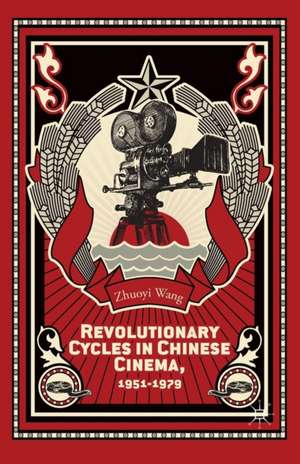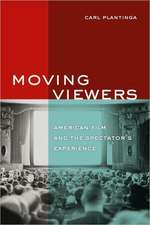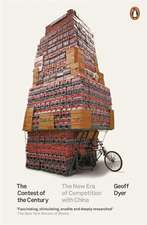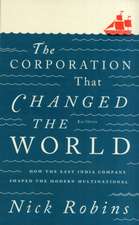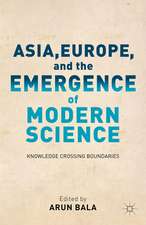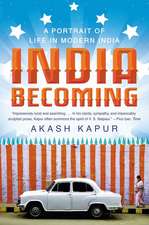Revolutionary Cycles in Chinese Cinema, 1951–1979
Autor Z. Wangen Limba Engleză Paperback – 17 iul 2014
| Toate formatele și edițiile | Preț | Express |
|---|---|---|
| Paperback (1) | 384.86 lei 6-8 săpt. | |
| Palgrave Macmillan US – 17 iul 2014 | 384.86 lei 6-8 săpt. | |
| Hardback (1) | 585.26 lei 6-8 săpt. | |
| Palgrave Macmillan US – 17 iul 2014 | 585.26 lei 6-8 săpt. |
Preț: 384.86 lei
Nou
Puncte Express: 577
Preț estimativ în valută:
73.65€ • 76.46$ • 61.41£
73.65€ • 76.46$ • 61.41£
Carte tipărită la comandă
Livrare economică 22 martie-05 aprilie
Preluare comenzi: 021 569.72.76
Specificații
ISBN-13: 9781349478477
ISBN-10: 1349478474
Pagini: 274
Ilustrații: XV, 274 p. 15 illus.
Dimensiuni: 140 x 216 x 15 mm
Greutate: 0.34 kg
Ediția:1st ed. 2014
Editura: Palgrave Macmillan US
Colecția Palgrave Macmillan
Locul publicării:New York, United States
ISBN-10: 1349478474
Pagini: 274
Ilustrații: XV, 274 p. 15 illus.
Dimensiuni: 140 x 216 x 15 mm
Greutate: 0.34 kg
Ediția:1st ed. 2014
Editura: Palgrave Macmillan US
Colecția Palgrave Macmillan
Locul publicării:New York, United States
Cuprins
Introduction: Understanding Revolutionary Culture and Cinema 1. From The Life of Wu Xun to the Career of Song Jingshi : Adapting Private Studio Filmmaking Legacy for a Nationalized Cinema, 1951-1957 2. From Revolutionary Canon to Bourgeois White Flag: Blooming Flowers and the Full Moon (1958) in the Maoist Campaigns 3. From "a Hundred Flowers" to a "Poisonous Weed": Dangerous Opportunities for Satirical Comedies, 1955-1958 4. From Revolutionary Romanticism to Petty Bourgeois Fanaticism: The Great Leap Forward and Filmmakers' Stylistic Return to the Past, 1958-1960 5. From Disaster to Laughter: Making Comedies in a Changing Political Landscape, 1959-1963 6. From Conflicting Authorities to Diverse Masses: Early Spring in February (1964) as 'Sugarcoated Poison' Conclusion: From the Ebb of the Revolution to the End of Revolutionary Cinema, 1967-1979
Recenzii
"Revolutionary Cycles in Chinese Cinema provides a detailed, insightful, and vivid guide to the Maoist period. Looking at the conception, production, distribution, and reception of movies from 1949 to 1976, Wang fleshes out Chinese film culture in troubled times. Examining both material circumstances and ideological debates, he shows in fine detail how filmmakers operated, what facilitated their work, and which obstacles they faced. This book is indispensable reading for those interested in the interaction between film and politics and in the power of culture in times of adversity." - Yomi Braester, University of Washington, USA
"A meticulous analysis of micro-level maneuvering by bureaucrats, artists, and critics, Revolutionary Cycles in Chinese Cinema demonstrates that Chinese socialist revolution was never a unilinear teleological progression but rather a rapid succession of cycles marked by disruptions and assumptions of order with consequences oftentimes beyond anybody's anticipation and control. Wang is commended for probing beneath the deceptive surface of revolutionary rhetoric and revealing quandaries and ruptures that repeatedly compromised revolutionary and artistic goals. " - Yingjin Zhang, Professor of Literature, University of California, San Diego, USA and author of Cinema, Space, and Polylocality in a Globalizing China (2010).
"This concise and incisive book makes an important intervention into the study of Chinese film history. . . Rather than focusing on the films alone or the policies and production practices that shape them, Wang draws on Rick Altman's insights about film genres to emphasize what he calls a 'user-centred' approach. He examines how different social and political groups use films for their own purposes, and how this shapes both their production and reception. The result is not only a livelier and more engaging picture of
Chinese revolutionary era film history but also a model for conducting this new kind of film history. . . [It] is exemplary and merits wide attention." - Viewfinder
"Wang is to be commended for making a daring move into uncharted territory and providing a much-needed comprehensive history of Chinese cinema during the Mao era. He has made an important intervention and expanded our vocabulary in discussing the production, distribution, and reception of films that are different from and yet similar to those produced in a capitalist system." - Modern Chinese Literature and Culture
"A meticulous analysis of micro-level maneuvering by bureaucrats, artists, and critics, Revolutionary Cycles in Chinese Cinema demonstrates that Chinese socialist revolution was never a unilinear teleological progression but rather a rapid succession of cycles marked by disruptions and assumptions of order with consequences oftentimes beyond anybody's anticipation and control. Wang is commended for probing beneath the deceptive surface of revolutionary rhetoric and revealing quandaries and ruptures that repeatedly compromised revolutionary and artistic goals. " - Yingjin Zhang, Professor of Literature, University of California, San Diego, USA and author of Cinema, Space, and Polylocality in a Globalizing China (2010).
"This concise and incisive book makes an important intervention into the study of Chinese film history. . . Rather than focusing on the films alone or the policies and production practices that shape them, Wang draws on Rick Altman's insights about film genres to emphasize what he calls a 'user-centred' approach. He examines how different social and political groups use films for their own purposes, and how this shapes both their production and reception. The result is not only a livelier and more engaging picture of
Chinese revolutionary era film history but also a model for conducting this new kind of film history. . . [It] is exemplary and merits wide attention." - Viewfinder
"Wang is to be commended for making a daring move into uncharted territory and providing a much-needed comprehensive history of Chinese cinema during the Mao era. He has made an important intervention and expanded our vocabulary in discussing the production, distribution, and reception of films that are different from and yet similar to those produced in a capitalist system." - Modern Chinese Literature and Culture
Notă biografică
Zhuoyi Wang is Assistant Professor in the Department of East Asian Languages and Literatures at Hamilton College, USA.
